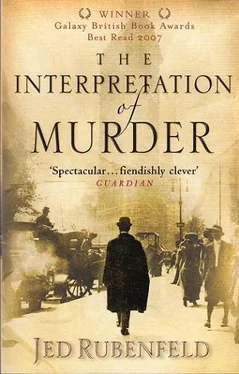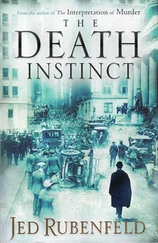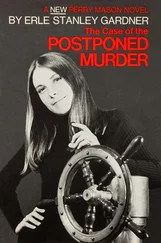Jed Rubenfeld - The Interpretation of Murder
Здесь есть возможность читать онлайн «Jed Rubenfeld - The Interpretation of Murder» весь текст электронной книги совершенно бесплатно (целиком полную версию без сокращений). В некоторых случаях можно слушать аудио, скачать через торрент в формате fb2 и присутствует краткое содержание. Жанр: Исторические приключения, на английском языке. Описание произведения, (предисловие) а так же отзывы посетителей доступны на портале библиотеки ЛибКат.
- Название:The Interpretation of Murder
- Автор:
- Жанр:
- Год:неизвестен
- ISBN:нет данных
- Рейтинг книги:5 / 5. Голосов: 1
-
Избранное:Добавить в избранное
- Отзывы:
-
Ваша оценка:
- 100
- 1
- 2
- 3
- 4
- 5
The Interpretation of Murder: краткое содержание, описание и аннотация
Предлагаем к чтению аннотацию, описание, краткое содержание или предисловие (зависит от того, что написал сам автор книги «The Interpretation of Murder»). Если вы не нашли необходимую информацию о книге — напишите в комментариях, мы постараемся отыскать её.
The Interpretation of Murder — читать онлайн бесплатно полную книгу (весь текст) целиком
Ниже представлен текст книги, разбитый по страницам. Система сохранения места последней прочитанной страницы, позволяет с удобством читать онлайн бесплатно книгу «The Interpretation of Murder», без необходимости каждый раз заново искать на чём Вы остановились. Поставьте закладку, и сможете в любой момент перейти на страницу, на которой закончили чтение.
Интервал:
Закладка:
'I thought you hated Shakespeare.'
'What is it like, Doctor, to be raised by someone you despise?'
'Wouldn't you know better than I, Miss Acton?'
'Me?' she said. 'I was raised by someone I love.'
'You do not usually display that emotion when speaking of your parents.'
'I am not speaking of my parents,' Nora replied. 'I am speaking of Mrs Biggs.'
'I didn't hate my father,' I said.
'I hate mine. At least I am not afraid to say so.'
The wind grew stronger. Perhaps the weather was turning. Nora gazed steadfastly at the shore. What exactly she meant to make me feel, I didn't know.
'We have this much in common, Miss Acton,' I said: 'We both grew up wishing not to be like our parents. Either of them. But defiance, Dr Freud says, shows just as much attachment as obedience.'
'I see: you have achieved detachment.'
Some minutes later, she asked me to tell her more about Freud's theories. I did, avoiding any mention of Oedipus and his cognates. Breaching the usual professional etiquette, I described to her some of my previous analysands — anonymously, of course — hoping to illustrate the workings of the transference and its extreme effects on analytic patients. To this end I told her about Rachel, the girl who had tried to disrobe for me in virtually every session.
'Was she good-looking?' asked Nora.
'No,' I lied.
'You're lying,' she said. 'Men always like that kind of girl. I suppose you had sex with her.'
'I certainly did not,' I answered, surprised by her explicitness.
'I am not in love with you, Doctor,' she said, as if it were a perfectly logical reply to make. 'I know that's what you think. I mistakenly supposed I had some feelings for you yesterday, but that was the product of very trying circumstances and your own declaration of affection for me.'
'Miss Acton — '
'Don't be alarmed. I don't hold you to it. I understand that what you said yesterday no longer reflects your true sentiments, just as what I said yesterday no longer reflects mine. I have no feelings for you. This, this transference of yours, which you say makes patients either love or hate their doctors, has no application to me. I am your patient, as you said. That is all.'
I let her words pass without response as the ferry churned upriver.
A little after noon on Friday, Detective Littlemore stood outside a small, filthy cell in the massive gray detention castle known as the Tombs. There was no daylight, no window anywhere in sight. Next to Littlemore was a prison guard. The two of them were staring through a grill of iron bars at the sprawled-out body of Chong Sing, who lay unconscious on a lousy cot. His white undershirt was badly stained. His feet were bare and dirty.
'He's asleep?' asked Littlemore.
Chuckling, the guard explained that Sergeant Becker had kept Chong up all last night. Littlemore was at first surprised to hear Becker's name. Then he realized: Miss Sigel was found in the Tenderloin, so the interrogation would naturally have been given to Becker. Still, the detective was puzzled. Chong had already talked yesterday; he had admitted seeing his cousin Leon kill the girl. The mayor had said so. What did Becker want with him last night?
The prison guard was able to answer that question. It was Becker who had made Chong talk in the first place. But Chong wouldn't admit to having assisted in the killing itself. He insisted he had gone into Leon's room only after the girl was already dead.
'And Becker didn't buy it?' asked Littlemore.
The guard hummed a little tune and shook his head. 'Kept at him real good. All night, like I said. Shoulda seen him.'
The sleeping Chong Sing turned over on the cot, revealing his right eye, purpled and swollen to the size of a plum. Dried blood was visible under Sing's nose and below his ear. The nose may have been broken, but Littlemore could not be sure.
'Oh, boy,' said the detective. 'Did Chong break?'
'Huh-uh.'
Littlemore had the guard open the cell. He woke the sleeping prisoner. The detective pulled up a chair, lit himself a cigarette, and offered one to the Chinese. Chong eyed his new interrogator unhappily. He took the cigarette.
'I know you understand English, Mr Chong,' said Littlemore. 'I may be able to help you. Just answer a couple of questions. When did you start working at the Balmoral, end of July?'
Chong Sing nodded.
'What about down at the bridge?' asked the detective.
'Maybe same time,' he said hoarsely. 'Maybe few days later.'
'If you weren't there, Chong, how'd you see it?' asked Littlemore.
'Hah?'
'If you went into Leon's room after he killed the girl, how do you know he killed her?'
'I told already,' Chong replied. 'I hear fighting. I look through keyhole.'
Littlemore glanced at the guard, who confirmed that Chong had told the same story the day before. The detective turned back to Chong Sing. 'Is that right?'
'That right.'
'No, it's not. I was there, Mr Chong, remember? I went to Leon's room. I picked the lock. I looked through that keyhole. You can't see anything through it.'
Chong was silent.
'How'd you get those jobs, Chong? How'd you get two jobs working for Mr Banwell?'
The Chinese shrugged.
'I'm trying to help you,' said Littlemore.
'Leon,' said Chong quietly. 'He got me jobs.'
'How did Leon know Banwell?'
'I don't know.'
'You don't know?'
'I don't know,' Chong Sing insisted. 'I not murder anyone.'
Littlemore rose and signaled the guard to open the cell again. 'I know you didn't,' he said.
The Actons' summer cottage was a cottage in the Newport sense of the word, meaning an estate aspiring to — indeed, exceeding — the standards of lower European royalty. I had intended to return to the city after seeing Nora to the door, but I found I couldn't. I didn't want to leave her alone, even here.
The servants greeted Nora warmly, throwing open doors and windows in a flurry of activity. They appeared to know nothing of her travails. Although barely speaking, Nora evidently wanted me to see everything. She led me through the first floor of the main house. A double-winged marble staircase ascended from the gallery of its two-story entry hall. To the right was a stained-glass cupola; to the left an octagonal, wood-beamed library. Marble columns and gilded plaster abounded.
In back was a tile-ceilinged veranda. A rolling sward of green grass and tall oaks descended clear down to the river far below. The girl set out into the greenery. I followed, and we arrived shortly at the stables, where the air smelled wholesomely of horse and fresh hay. It turned out the cook had already taken the liberty of sending a picnic basket down to the stable in case Miss Nora wanted to go for a ride.
She proved every bit as good a rider as I. After a quick canter, we spread a blanket in a shady spot with a magnificent view of the Hudson. Inside the picnic basket, we found a dozen clams packed on ice, cold chicken, potato croquettes, a tin full of tiny soda biscuits, and a cherry and watermelon salad. Along with a canteen of iced tea, the cook had included a half bottle of claret, evidently for 'the gentleman.' I had not eaten a thing since the previous evening.
When we were done, Nora asked me, 'Are you honest?'
'To a fault,' I said, 'but only because I am such a bad actor. Will the servants call your parents to tell them you're here?'
'There's no telephone.' She removed her panama hat, allowing the sun to tangle up its rays in her hair. 'I am sorry for my behavior on the ferry, Doctor. I don't know why I brought up your father. Please forgive me. I feel I am in a house that's burning down and there's no way out. Clara is the only person I have been able to turn to, and now even she can't help me.'
'There is a way out,' I said. 'You will stay here till Sunday. You will then be eighteen and out of your parents' control. At the same time, with any luck, Detective Littlemore will have traced the evidence we found to Banwell and arrest him.'
Читать дальшеИнтервал:
Закладка:
Похожие книги на «The Interpretation of Murder»
Представляем Вашему вниманию похожие книги на «The Interpretation of Murder» списком для выбора. Мы отобрали схожую по названию и смыслу литературу в надежде предоставить читателям больше вариантов отыскать новые, интересные, ещё непрочитанные произведения.
Обсуждение, отзывы о книге «The Interpretation of Murder» и просто собственные мнения читателей. Оставьте ваши комментарии, напишите, что Вы думаете о произведении, его смысле или главных героях. Укажите что конкретно понравилось, а что нет, и почему Вы так считаете.












